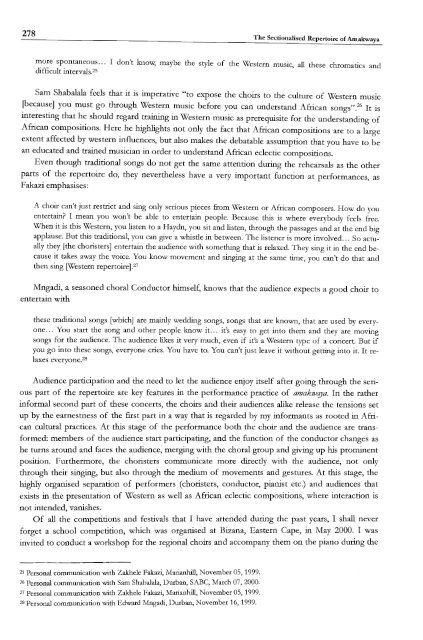South African Choral Music (Amakwaya): Song, Contest and the ...
South African Choral Music (Amakwaya): Song, Contest and the ...
South African Choral Music (Amakwaya): Song, Contest and the ...
You also want an ePaper? Increase the reach of your titles
YUMPU automatically turns print PDFs into web optimized ePapers that Google loves.
278 The Sectionalised Repertoire of<strong>Amakwaya</strong><br />
more spontaneous... I don't know; maybe <strong>the</strong> style of <strong>the</strong> Western music, all <strong>the</strong>se chromatics <strong>and</strong><br />
difficult intervals.25<br />
Sam Shabalala feels that it is imperative "to expose <strong>the</strong> choirs to <strong>the</strong> culture of Western music<br />
[because] you must go through Western music before you can underst<strong>and</strong> <strong>African</strong> songs".26 It is<br />
interesting that he should regard training in Western music as prerequisite for <strong>the</strong> underst<strong>and</strong>ing of<br />
<strong>African</strong> compositions. Here he highlights not only <strong>the</strong> fact that <strong>African</strong> compositions are to a large<br />
extent affected by western influences, but also makes <strong>the</strong> debatable assumption that you have to be<br />
an educated <strong>and</strong> trained musician in order to underst<strong>and</strong> <strong>African</strong> eclectic compositions.<br />
Even though traditional songs do not get <strong>the</strong> same attention during <strong>the</strong> rehearsals as <strong>the</strong> o<strong>the</strong>r<br />
parts of <strong>the</strong> repertoire do, <strong>the</strong>y never<strong>the</strong>less have a very important function at performances, as<br />
Fakazi emphasises:<br />
A choir can't just restrict <strong>and</strong> sing only serious pieces from Western or <strong>African</strong> composers. How do you<br />
entertain? I mean you won't be able to entertain people. Because this is where everybody feels free.<br />
When it is this Western, you listen to a Haydn, you sit <strong>and</strong> listen, through <strong>the</strong> passages <strong>and</strong> at <strong>the</strong> end big<br />
applause. But this traditional, you can give a whisde in between. The listener is more involved... So actually<br />
<strong>the</strong>y [<strong>the</strong> choristers] entertain <strong>the</strong> audience with something that is relaxed. They sing it in <strong>the</strong> end because<br />
it takes away <strong>the</strong> voice. You know movement <strong>and</strong> singing at <strong>the</strong> same time, you can't do that <strong>and</strong><br />
<strong>the</strong>n sing [Western repertoire].27<br />
Mngadi, a seasoned choral Conductor himself, knows that <strong>the</strong> audience expects a good choir to<br />
entertain with<br />
<strong>the</strong>se traditional songs [which] are mainly wedding songs, songs that are known, that are used by everyone...<br />
You start <strong>the</strong> song <strong>and</strong> o<strong>the</strong>r people know it... it's easy to get into <strong>the</strong>m <strong>and</strong> <strong>the</strong>y are moving<br />
songs for <strong>the</strong> audience. The audience likes it very much, even if it's a Western type of a concert. But if<br />
you go into <strong>the</strong>se songs, everyone cries. You have to. You can't just leave it without getting into it. It relaxes<br />
everyone. 28<br />
Audience participation <strong>and</strong> <strong>the</strong> need to let <strong>the</strong> audience enjoy itself after going through <strong>the</strong> seri<br />
ous part of <strong>the</strong> repertoire are key features in <strong>the</strong> performance practice of amakwqya. In <strong>the</strong> ra<strong>the</strong>r<br />
informal second part of <strong>the</strong>se concerts, <strong>the</strong> choirs <strong>and</strong> <strong>the</strong>ir audiences alike release <strong>the</strong> tensions set<br />
up by <strong>the</strong> earnestness of <strong>the</strong> first part in a way that is regarded by my informants as rooted in Afri<br />
can cultural practices. At this stage of <strong>the</strong> performance both <strong>the</strong> choir <strong>and</strong> <strong>the</strong> audience are trans<br />
formed: members of <strong>the</strong> audience start participating, <strong>and</strong> <strong>the</strong> function of <strong>the</strong> conductor changes as<br />
he turns around <strong>and</strong> faces <strong>the</strong> audience; merging with <strong>the</strong> choral group <strong>and</strong> giving up his prominent<br />
position. Fur<strong>the</strong>rmore, <strong>the</strong> choristers communicate more direcdy with <strong>the</strong> audience, not only<br />
through <strong>the</strong>ir singing, but also through <strong>the</strong> medium of movements <strong>and</strong> gestures. At this stage, <strong>the</strong><br />
highly organised separation of performers (choristers, conductor, pianist etc.) <strong>and</strong> audiences that<br />
exists in <strong>the</strong> presentation of Western as well as <strong>African</strong> eclectic compositions, where interaction is<br />
not intended, vanishes.<br />
Of all <strong>the</strong> competitions <strong>and</strong> festivals that I have attended during <strong>the</strong> past years, I shall never<br />
forget a school competition, which was organised at Bizana, Eastern Cape, in May 2000. I was<br />
invited to conduct a workshop for <strong>the</strong> regional choirs <strong>and</strong> accompany <strong>the</strong>m on <strong>the</strong> piano during <strong>the</strong><br />
25 Personal communication with Zakhele Fakazi, Marianhill, November 05,1999.<br />
26 Personal communication with Sam Shabalala, Durban, SABC, March 07, 2000.<br />
27 Personal communication with Zakhele Fakazi, Marianhill, November 05,1999.<br />
28 Personal communication with Edward Mngadi, Durban, November 16, 1999.

















